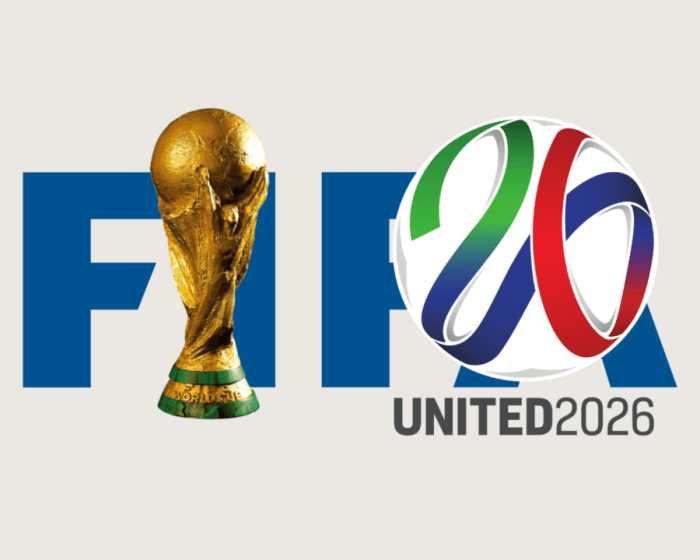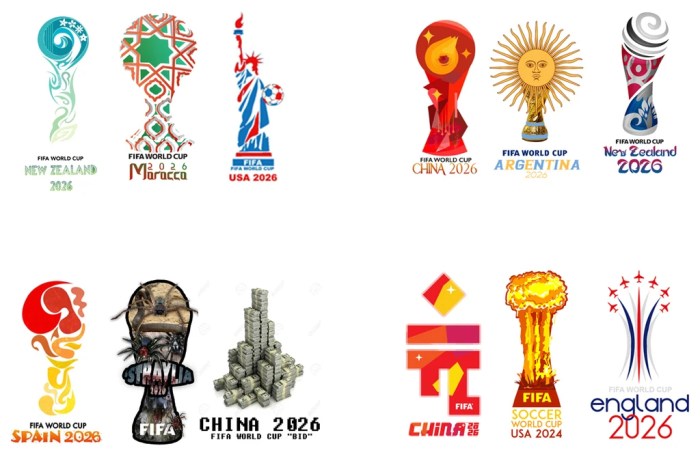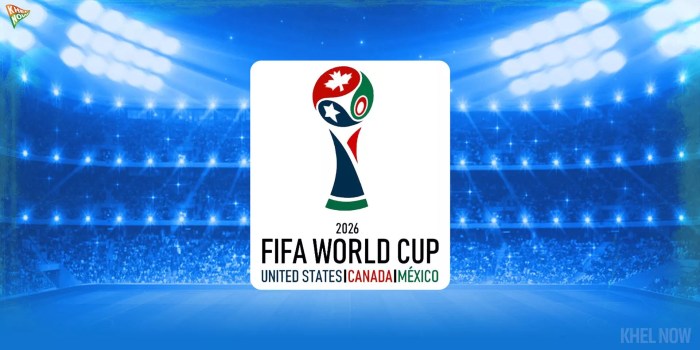The 2026 FIFA World Cup, the pinnacle of international football, is poised to captivate the world with its thrilling matches, unforgettable moments, and cultural impact. With the United States, Canada, and Mexico jointly hosting the tournament, this edition promises to be a truly global spectacle that will leave an enduring legacy on the sport and beyond.
From the grandeur of the opening ceremony to the nail-biting final, the 2026 FIFA World Cup will showcase the world’s best footballers and provide a platform for national pride and global unity. The tournament will also serve as a catalyst for social, economic, and environmental progress in the host countries.
History and Background
The FIFA World Cup is the most prestigious international football tournament in the world, contested by the men’s national teams of the member associations of the Fédération Internationale de Football Association (FIFA). The tournament was first held in Uruguay in 1930 and has been held every four years since then, except in 1942 and 1946 due to World War II.
With the excitement of the 2026 FIFA World Cup approaching, Melbourne is gearing up to welcome fans from around the globe. To enhance their cultural experience, visitors can explore the renowned Arts Centre Melbourne , a vibrant hub for performing arts and exhibitions.
As the tournament draws near, the Arts Centre will offer an array of events and performances that complement the World Cup’s festive atmosphere.
The World Cup has had a profound impact on the global football landscape. It has helped to popularize the sport and has led to the development of new playing styles and tactics. The tournament has also played a significant role in the development of national identities and has helped to foster a sense of unity and pride among fans.
Evolution of the Tournament
The World Cup has undergone several changes over the years, including the expansion of the number of teams participating in the tournament and the introduction of new rules and regulations. The first World Cup in 1930 featured just 13 teams, while the most recent tournament in 2022 featured 32 teams. The tournament has also seen the introduction of new technologies, such as goal-line technology and video assistant referees (VAR).
Significance of the Tournament
The World Cup is considered to be the pinnacle of international football. It is a tournament that brings together the best players in the world and showcases the highest level of competition. The tournament is also a major cultural event, with fans from all over the world coming together to celebrate their love of football.
With the 2026 FIFA World Cup drawing near, fans worldwide are gearing up for the spectacle. While the games themselves will be the main attraction, those looking for a luxurious escape can consider the exquisite luxury beach resorts in the host cities.
These resorts offer opulent accommodations, world-class amenities, and stunning ocean views, ensuring an unforgettable experience both on and off the field.
Host Country and Preparations

The United States, Canada, and Mexico will jointly host the 2026 FIFA World Cup, marking the first time three nations have collaborated to stage the tournament.
Each host country is responsible for preparing its infrastructure, including stadiums, transportation systems, and accommodation, to accommodate the influx of fans and teams. The United States will host 60 matches, including the final, while Canada and Mexico will each host 10 matches.
Stadiums
The United States will build or renovate 10 stadiums for the World Cup, including the new SoFi Stadium in Los Angeles, which will host the opening match. Canada will build or renovate three stadiums, including the BC Place Stadium in Vancouver, while Mexico will build or renovate three stadiums, including the Estadio Azteca in Mexico City.
Transportation
All three host countries are investing in transportation infrastructure to improve access to the stadiums and other World Cup-related events. The United States is investing in high-speed rail lines and expanded public transportation, while Canada is investing in new light rail lines and expanded bus service. Mexico is investing in new highways and expanded airport capacity.
Cultural and Economic Impact, 2026 fifa world cup
Hosting the World Cup is expected to have a significant cultural and economic impact on all three host countries. The tournament will showcase the countries’ cultures and traditions to a global audience, and it is expected to attract millions of tourists. The World Cup is also expected to boost economic growth in the host countries, as it will create jobs and stimulate investment.
Participating Teams and Qualification

The 2026 FIFA World Cup will feature 48 teams, up from 32 in previous tournaments. The qualification process will begin in 2023 and will see teams from all over the world compete for a place in the finals. The top teams from each confederation will qualify automatically, while the remaining teams will compete in playoffs to determine the final participants.
Top Contenders
The top contenders for the 2026 FIFA World Cup include the defending champions France, as well as other powerhouses such as Brazil, Argentina, England, and Germany. These teams have a wealth of experience and talent and will be looking to add to their World Cup titles. However, there are also a number of rising stars in international football, such as Belgium, Croatia, and Senegal, who will be looking to make a name for themselves on the world stage.
Qualification Strategies
Teams will employ a variety of strategies and tactics in order to qualify for the 2026 FIFA World Cup. Some teams will focus on building a strong defense, while others will look to attack with pace and flair. The most successful teams will be those that can find a balance between these two approaches and adapt their play to the strengths and weaknesses of their opponents.
As the excitement for the 2026 FIFA World Cup grows, soccer enthusiasts can delve into the rich history of the sport at the Ashmolean Museum in Oxford. The museum’s collection boasts artifacts and memorabilia that trace the evolution of football from its humble beginnings to the global phenomenon it is today.
Returning to the 2026 FIFA World Cup, fans can anticipate a thrilling spectacle of skill and sportsmanship as the world’s best teams compete for the coveted trophy.
The 2026 FIFA World Cup promises to be an exciting and competitive tournament. With 48 teams competing for the title, there are sure to be plenty of surprises and upsets along the way. The top teams in the world will be looking to add to their legacy, while the rising stars will be looking to make a name for themselves. The stage is set for an unforgettable tournament.
Match Schedule and Format
The 2026 FIFA World Cup will feature a significantly expanded format, with 48 teams participating instead of the previous 32. This expansion has implications for the match schedule and format of the tournament.
Group Stage
The group stage will see the 48 teams divided into 16 groups of three teams each. Each team will play two matches within their group, with the top two teams from each group advancing to the knockout rounds. This format is different from previous World Cups, where teams were divided into groups of four and played three matches each.
Knockout Rounds
The knockout rounds will consist of 16 teams that advanced from the group stage. The teams will be seeded based on their performance in the group stage, with the top seeds facing the lowest seeds in the first round. The knockout rounds will be played in a single-elimination format, with the winner of each match advancing to the next round.
Final
The final match of the 2026 FIFA World Cup will be played on July 12, 2026, at MetLife Stadium in East Rutherford, New Jersey. The two teams that reach the final will compete for the World Cup trophy.
Impact of Expanded Format
The expanded format of the 2026 FIFA World Cup is expected to have a significant impact on the tournament. The increased number of teams means that there will be more matches played, and the knockout rounds will be more competitive. The expanded format also gives more countries a chance to qualify for the World Cup, which could lead to a more diverse and exciting tournament.
Key Players and Performances: 2026 Fifa World Cup
The 2026 FIFA World Cup will showcase the world’s most talented footballers, who will have the opportunity to make their mark on the global stage. With so much talent on display, it is difficult to narrow down the list of key players to watch, but here are a few of the most exciting players to keep an eye on.
The individual performances of these players will have a major impact on the outcome of the tournament. They will be expected to lead their teams to victory, and they will be under immense pressure to perform at their best. But if they can rise to the occasion, they will have the opportunity to become legends of the game.
Standout Players
- Kylian Mbappé (France): The reigning World Cup Golden Boot winner, Mbappé is one of the most exciting young players in the world. He is a lightning-fast winger with incredible dribbling skills and a clinical finishing ability.
- Erling Haaland (Norway): Haaland is one of the most prolific goalscorers in the world. He is a physical specimen with incredible strength and speed, and he has a knack for finding the back of the net.
- Kevin De Bruyne (Belgium): De Bruyne is one of the best midfielders in the world. He is a creative genius with incredible vision and passing ability.
- Lionel Messi (Argentina): Messi is one of the greatest players of all time. He is a magician on the ball with incredible dribbling skills and a deadly left foot.
- Cristiano Ronaldo (Portugal): Ronaldo is one of the most decorated players in the world. He is a goal-scoring machine with incredible athleticism and determination.
These are just a few of the key players to watch in the 2026 FIFA World Cup. With so much talent on display, it is sure to be an unforgettable tournament.
Memorable Moments and Iconic Goals
The 2026 FIFA World Cup will be filled with memorable moments and iconic goals. Here are a few of the most anticipated moments of the tournament:
- The opening match: The opening match of the World Cup is always a special occasion, and the 2026 tournament will be no different. The host nation will take on a yet-to-be-determined opponent in the first match of the tournament, and the atmosphere will be electric.
- The group stage: The group stage of the World Cup is always full of surprises, and the 2026 tournament is sure to be no different. There will be plenty of upsets and unexpected results, and the race to qualify for the knockout stage will be intense.
- The knockout stage: The knockout stage of the World Cup is where the real drama begins. The best teams in the world will be competing for the trophy, and the matches will be intense and unforgettable.
- The final: The final of the World Cup is the biggest match in the world, and the 2026 tournament will be no different. The two best teams in the world will face off for the trophy, and the match will be sure to be a classic.
These are just a few of the most anticipated moments of the 2026 FIFA World Cup. With so much excitement on the horizon, it is sure to be an unforgettable tournament.
Technology and Innovation

The 2026 FIFA World Cup will witness a significant leap in technological advancements, transforming the game in unprecedented ways. From the implementation of VAR to the utilization of data analytics and AI, technology will play a pivotal role in enhancing the overall experience for players, coaches, and fans alike.
VAR and Other Technological Advancements
The introduction of VAR (Video Assistant Referee) in the 2018 FIFA World Cup revolutionized the game by providing referees with access to video replays during crucial moments. VAR has significantly reduced the number of incorrect calls, leading to fairer and more accurate decision-making. The 2026 World Cup will further refine VAR’s capabilities, ensuring its seamless integration into the game without disrupting the flow of play. Additionally, other technological advancements, such as goal-line technology and semi-automated offside detection, will be employed to provide referees with even more precise and reliable information.
Data Analytics and AI in Team Preparation and Match Analysis
Data analytics and AI are becoming increasingly prevalent in the world of football, and the 2026 World Cup will showcase their transformative impact. Teams will utilize advanced data analysis techniques to identify patterns, trends, and weaknesses in their opponents’ play, enabling them to develop tailored strategies and tactics. AI-powered systems will assist coaches in player selection, training optimization, and real-time match analysis, providing them with invaluable insights to make informed decisions. By leveraging data and AI, teams can gain a competitive edge and improve their chances of success.
Cultural Impact and Legacy
The 2026 FIFA World Cup is poised to leave an indelible cultural mark on the host countries and the global community. The tournament will showcase the rich tapestry of cultures, traditions, and customs of the host nations, fostering cross-cultural understanding and appreciation.
Social Legacy
The World Cup is a catalyst for social change and unity. It brings people from all walks of life together, creating a shared sense of purpose and celebration. The tournament can inspire social cohesion, tolerance, and respect, breaking down barriers and promoting inclusivity.
Economic Legacy
The World Cup has a significant economic impact on host countries. The influx of tourists, media, and business delegates boosts economic activity, creating jobs and stimulating local businesses. Infrastructure development, such as stadium construction and transportation upgrades, leaves a lasting legacy for the host communities.
Environmental Legacy
FIFA has committed to making the 2026 World Cup the first carbon-neutral tournament in history. This involves implementing sustainable practices throughout the planning, operations, and legacy phases. The tournament will promote environmental awareness, encourage eco-friendly practices, and leave a positive environmental legacy for future generations.
Global Unity and Cultural Exchange
The World Cup is a global sporting spectacle that transcends borders and cultures. It provides a platform for nations to showcase their unique identities, share their stories, and foster a sense of global community. The tournament promotes cultural exchange, fostering mutual understanding and appreciation among people from different backgrounds.
Final Summary

As the 2026 FIFA World Cup draws near, the excitement and anticipation continue to build. This tournament promises to be a celebration of football, culture, and global unity. It will be an unforgettable event that will leave a lasting impact on the sport, the host countries, and the world at large.
FAQ Overview
When will the 2026 FIFA World Cup be held?
The 2026 FIFA World Cup will be held from June 14th to July 15th, 2026.
Which countries are hosting the 2026 FIFA World Cup?
The 2026 FIFA World Cup will be jointly hosted by the United States, Canada, and Mexico.
How many teams will participate in the 2026 FIFA World Cup?
A total of 48 teams will participate in the 2026 FIFA World Cup, up from 32 teams in previous editions.